Being involved in a car accident can be distressing and overwhelming. The aftermath is characterized by a flurry of legalities that can feel daunting. To help you navigate this challenging time and ensure that you receive the compensation you’re entitled to, we’ve compiled essential advice to guide you through the post-accident process.
Key Takeaways:
- Take immediate steps to ensure safety for yourself and others involved.
- Report the accident to the authorities and obtain a police report.
- Exchange contact and insurance information with the other party.
- Document the accident scene with photos and videos.
- Notify your insurance company promptly.
Ensure Safety First
After a car accident, the first priority should always be the safety of yourself and others involved. It is crucial to ensure that further accidents are prevented by moving to a safe location away from traffic.
If possible, turn on your hazard lights to alert other drivers of the accident.
Before assessing the damage, it is important to check yourself and others for any injuries. Adrenaline from the accident can mask pain or injuries that may be serious, so it is recommended to seek medical attention.
If you or anyone involved in the accident requires immediate medical assistance, call 911 or emergency services right away. They can provide the necessary support and transport injured individuals to the nearest hospital.
Remember, even if you feel fine, it is important to seek medical attention. Early detection of injuries will prevent any further complications and ensure proper care and treatment.
Seeking medical attention after a car accident will also create an official record of your injuries, which will be important if you decide to pursue compensation from insurance companies or take legal action against the responsible party.
In addition to your own safety, consider the safety of others on the road. If possible, warn oncoming traffic by placing hazard triangles or flares at a safe distance from the accident scene.
Taking these precautionary measures will not only ensure safety but also provide necessary documentation and evidence for insurance claims or legal proceedings that may follow the car accident. Remember, prioritize safety above all else.
Call The Authorities
After being involved in a car accident, it is crucial to report the incident to the authorities. This step becomes even more important if there are injuries or significant damage resulting from the accident. By calling the authorities, you ensure that a police report is generated, documenting the accident scene, the parties involved, and the details of the event. This police report serves as a crucial piece of evidence when filing an insurance claim or if legal action becomes necessary.
Cooperating fully with the authorities is essential. Provide accurate and detailed information about the accident, the parties involved, and any other relevant details. Remember to remain calm and composed while speaking with the authorities. By following these steps, you strengthen your case and increase your chances of receiving the compensation you deserve.
Remember, a police report acts as a solid foundation for your insurance claim or any legal action that may arise from the accident. It provides an objective account of the incident, allowing insurers and attorneys to assess the situation accurately. Hesitating to call the authorities or report the accident may jeopardize your ability to seek compensation and protect your rights.
If you are unsure about whether to call the authorities, it is always better to err on the side of caution. It is far better to have a police report and not need it than to face difficulties later on without one. The authorities are equipped to handle these situations and are trained to gather relevant information and assess the scene effectively.
“Reporting the car accident to the police is a crucial step in the aftermath of an accident. It not only helps create an official record of the incident but also aids in establishing liability if legal action is pursued.” – John Smith, Car Accident Attorney.
By calling the authorities and reporting the accident, you lay the groundwork for a potential insurance claim or legal action. Remember to keep a copy of the police report and provide it to your insurance company promptly. This report serves as an important piece of evidence when explaining the circumstances surrounding the accident.
Next, we will discuss the importance of exchanging information with the other party involved in the accident.
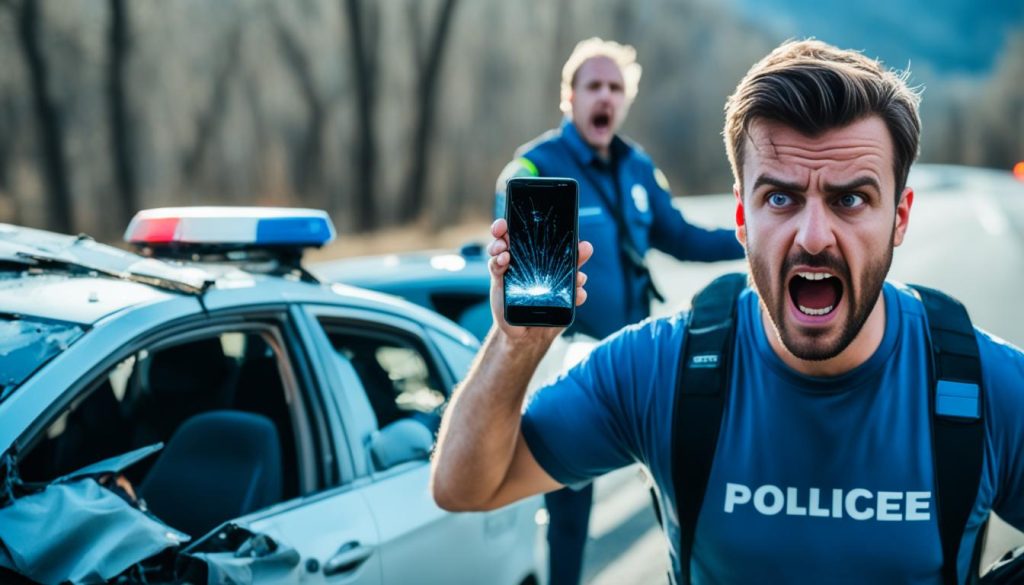
Exchange Information
After a car accident, it is crucial to exchange contact and insurance information with the other driver(s) involved. This step is essential for ensuring smooth and efficient communication throughout the claims process. By exchanging information, you can establish a line of contact and gather the necessary details to move forward with resolving any disputes that may arise.
When exchanging information, make sure to gather the following:
- Contact information: Exchange names, addresses, and phone numbers. This will allow both parties to easily reach each other for any updates or clarifications.
- Driver’s license numbers: Share your driver’s license numbers to verify identification and ensure accurate information exchange.
- License plate numbers: Take note of the license plate numbers of all vehicles involved in the accident. This information is necessary for proper documentation.
- Insurance policy details: Obtain the name of the insurance company, policy number, and contact information from the other driver(s). This will assist in initiating the claims process.
Furthermore, if there were any witnesses to the accident, it is crucial to collect their contact information as well. Witnesses can provide valuable accounts of the incident, which can be instrumental in resolving disputes and strengthening your case. Be sure to ask for their names, addresses, and phone numbers, and thank them for their willingness to provide witness testimony if needed.
Remember, resolving disputes and ensuring fair compensation is easier when you have accurate and complete information at hand. Exchange information promptly and courteously with the other party involved, and document everything thoroughly to protect your rights.
By exchanging information and gathering the necessary details, you are taking proactive steps towards a smoother post-accident process. Make sure to note down the information in a safe place, such as your phone or a dedicated accident information folder, so that it is readily accessible when needed.

Document The Scene
When involved in a car accident, it is crucial to document the scene thoroughly. By capturing photos and videos of the accident scene, you can gather essential evidence to support your insurance claims and legal proceedings for compensation.
Start by taking photos of all the vehicles involved in the accident. Include shots from different angles to clearly show the damages sustained. These visual records will help establish the extent of the impact and provide valuable evidence in your case.
Additionally, it is important to document any other relevant information, such as the road conditions and traffic signs. These details can help piece together the sequence of events that led to the accident.
If there are any injuries resulting from the accident, be sure to take photos of those as well. This includes any visible cuts, bruises, or other physical damage. These images will support your claims for compensation for medical expenses and pain and suffering.
Remember to always prioritize your safety and the safety of others at the accident scene. Only document the scene when it is safe to do so.
By documenting the scene, you are providing concrete visual evidence to support your insurance claims and potential legal proceedings. These records can help establish liability and demonstrate the impact of the accident, strengthening your case for the compensation you deserve.
Continue to the next section to learn about the importance of notifying your insurance company after an accident.
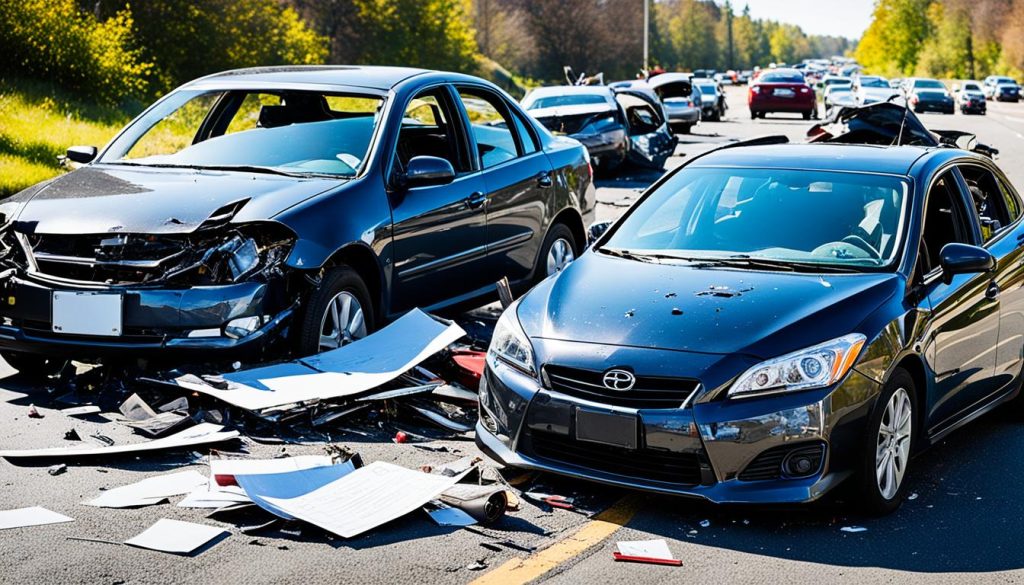
Notify Your Insurance Company
After being involved in a car accident, one of the first steps you should take is to notify your insurance company. It is crucial to inform them about the accident as soon as possible to initiate the claims process and ensure that you receive the necessary support.
When contacting your insurance company, provide them with all the relevant information and evidence you have collected. This includes details about the accident, such as the location, date, time, and any other parties involved. Be honest and transparent in your communication to establish trust.
It is also important to understand your insurance policy coverage. Review your policy documents to know what is covered and what is not. This will help you manage your expectations and be prepared for how the process may unfold. It is common for policies to cover vehicle repairs and medical expenses up to a certain limit, but it’s crucial to verify this with your insurance provider.
Additionally, your insurance company can guide you through the claims process and provide you with the necessary forms and documents. They will explain the steps you need to take and any deadlines you should be aware of.
Remember that open and clear communication with your insurance company is key. Keep a record of all correspondence, including phone calls and emails, for your reference. This will help you stay organized throughout the claims process and ensure that you have the necessary documentation to support your case.
If you have any questions or concerns, don’t hesitate to reach out to your insurance provider. They are there to assist you and help you navigate the process.
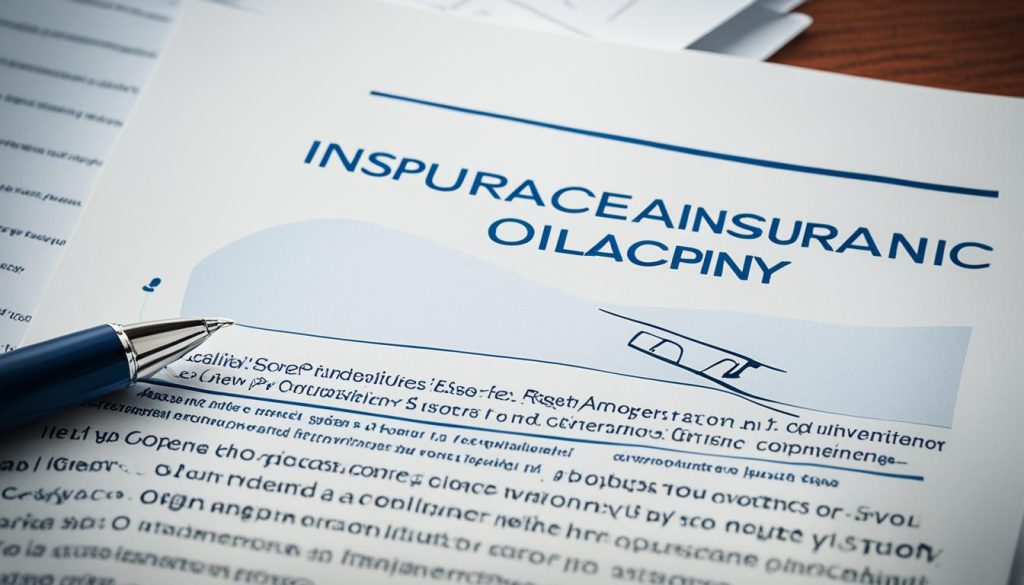
What to Provide to Your Insurance Company
- Accident details (location, date, time)
- Names and contact information of other parties involved
- Description of damages sustained
- Any photos or videos taken at the scene
- Police report, if available
- Medical records and expenses related to the accident
Seek Medical Attention
Even if you don’t immediately feel injured after the accident, it is important to seek medical attention. Some injuries, like whiplash, may not manifest until hours or days later. A thorough medical examination will ensure that any hidden injuries are diagnosed and treated promptly. It is essential to prioritize your health and well-being. Seeking medical attention not only helps in identifying and treating hidden injuries, but it also creates a thorough examination of your condition, providing a documented record of your injuries in the form of medical records. These records can serve as important evidence should you need to pursue compensation for your injuries later on.
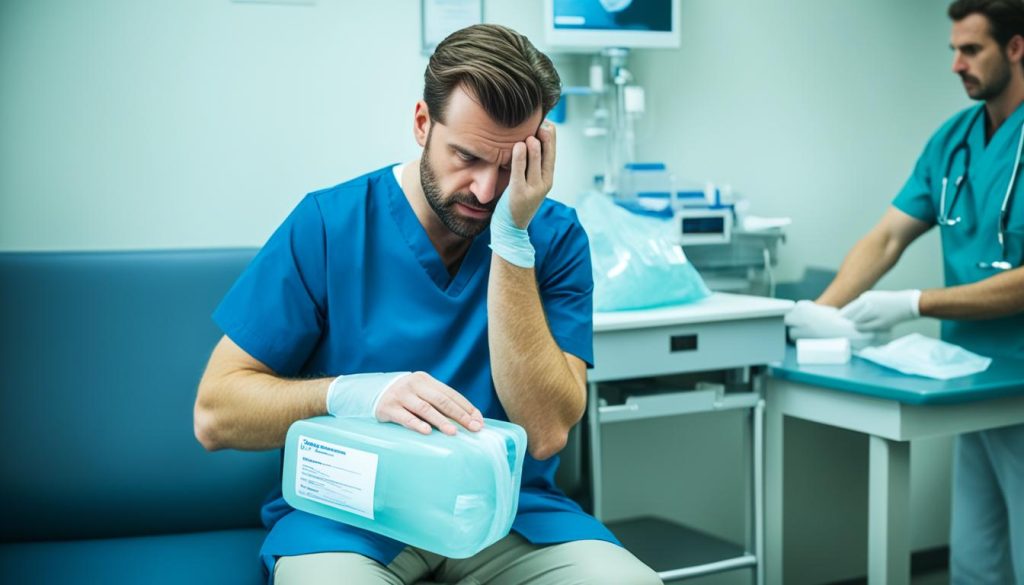
“It is important to remember that not all injuries are immediately apparent. Adrenaline and shock can mask pain and discomfort, leading to potential long-term consequences if left untreated. Seeking medical attention after an accident is crucial for your well-being and also strengthens your case for compensation.” – Dr. Emily Johnson, Emergency Medicine Specialist
Medical professionals are trained to identify even the most subtle signs of injury, helping to ensure that you receive the necessary care and treatment. Furthermore, seeking timely medical attention establishes a thorough examination of your condition, which is valuable when pursuing compensation. It provides a clear and documented record of your injuries and the subsequent medical treatment, reinforcing the connection between the accident and your physical well-being.
Remember to provide the medical professional with a detailed account of the accident and any symptoms you may be experiencing. It’s important to be open and honest about your pain or discomfort, even if it seems minor. This information will be crucial in determining the appropriate course of treatment and in maintaining accurate medical records that can support your compensation claim.
If you delay seeking medical attention, insurance companies and opposing parties may argue that your injuries were not related to the accident or that they are not as severe as claimed. By seeking medical attention promptly, you ensure that any injuries are properly evaluated and treated, and you protect your rights to receive fair compensation for your pain, suffering, medical expenses, and any future medical treatments that may be required. Don’t underestimate the importance of seeking medical attention following a car accident – it can make all the difference in your recovery and pursuit of compensation.
Conclusion
Navigating the legalities after a car accident can be complex and overwhelming, but with the right accident legal advice and following post-accident formalities, you can ensure that your rights are protected. By taking these necessary steps, you increase your chances of being fully compensated for your injuries and damages.
Remember, it is crucial to prioritize safety first and seek medical attention promptly, even if you don’t immediately feel injured. Reporting the accident to the authorities and exchanging information with the other party will provide essential documentation for insurance claims and potential legal proceedings.
Additionally, documenting the accident scene thoroughly through photos and videos will further support your case for compensation. Notify your insurance company as soon as possible and maintain open communication throughout the claims process. Seeking the guidance of a car accident attorney can provide valuable legal representation and help you navigate through the complexities of treatment and claims.
By following these steps diligently, you can confidently navigate the post-accident formalities, ensuring that you are fully compensated for your losses. Remember, accident legal advice and compliance with the necessary procedures are essential to protecting your rights and receiving the compensation you deserve.
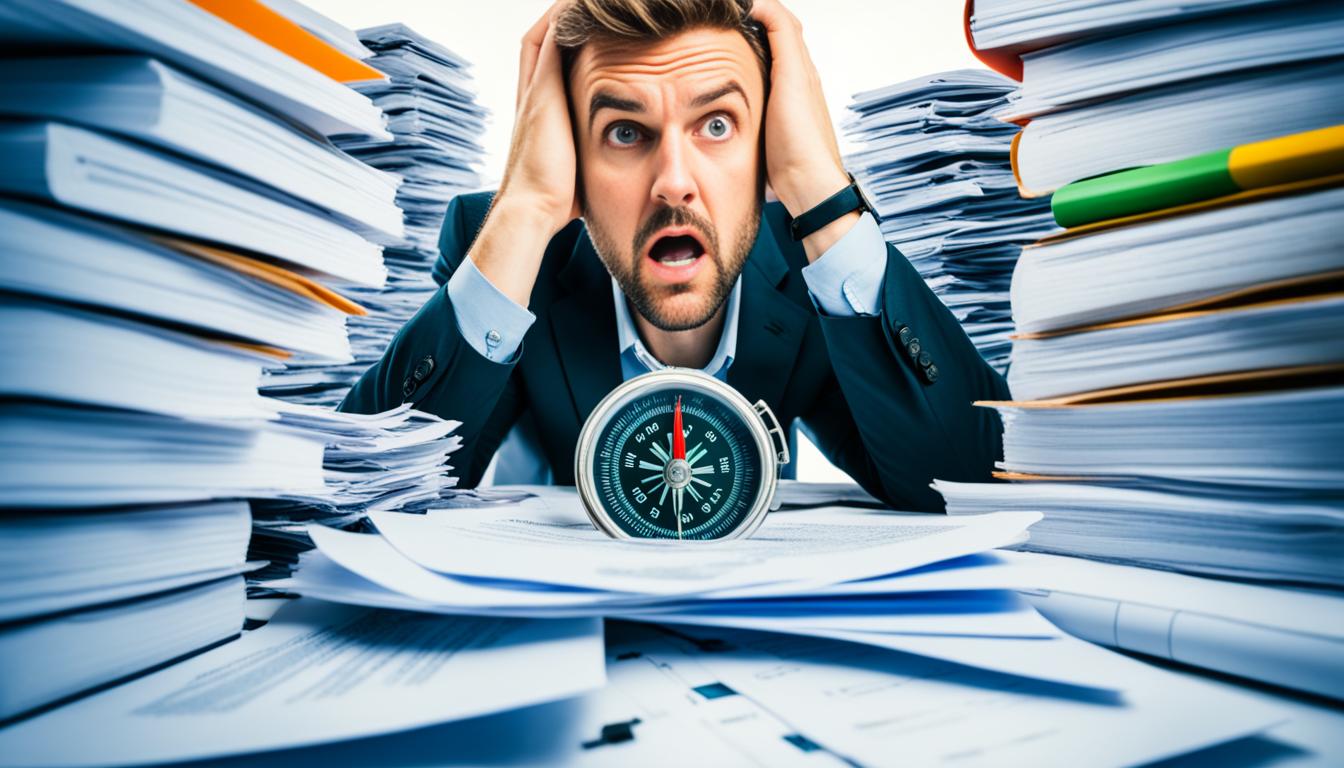



No comments! Be the first commenter?